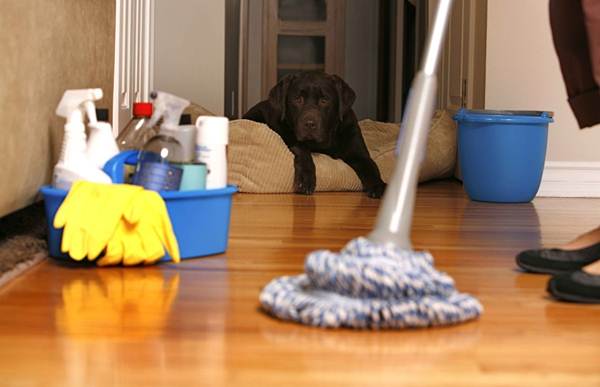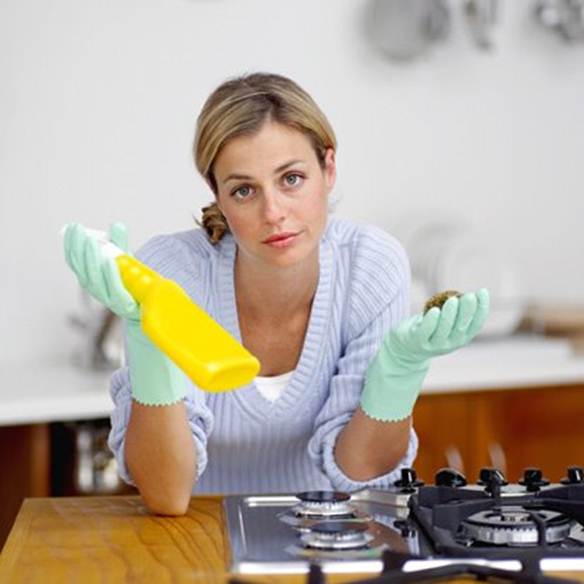Sparkling surfaces and lashings of
disinfectant are the height of fashion these days, but what’s our obsession
with cleanliness doing to our health?
A squeaky-clean home and work environment
might be your idea of heaven, but some research suggests that you need more
dirt in your life if you want a clean bill of health. We consulted two experts
to find out if it really is possible to be too clean…
Yes: Yes: Don’t be afraid of the dirt
‘It’s definitely possible to be too clean,’
says naturopathic practitioner Emma Alessandrini, ‘particularly during
childhood. Exposure to germs during infancy helps mature the immune system. The
body needs to be exposed to these to produce antibodies, strengthening its
ability to fight infection.’
One school of thought, commonly called the
hygiene hypothesis, suggests that exposure to bacteria can, in fact, be
beneficial. ‘The theory is that if we’re not exposed to bacteria and germs
during infancy, the immune system doesn’t develop correctly, leading to an
imbalance between Th1 and Th2 cells,’ explains Emma. ‘These cells are
responsible for killing viruses and bacteria.’ An imbalance can lead to a
susceptibility to some uncomfortable health conditions such as asthma, eczema
and hay fever. Adding weight to the theory is a study published by the
University of Bristol’ s School of Veterinary Sciences earlier this year which
found that growing up in a farm environment filled with complex germs and
bacteria can actually boost the immune system and protect against these kinds
of health problems.

‘New
research is showing that autoimmune diseases are also on the rise,’ says Emma
But it’s not just allergies that are the
issue. ‘New research is showing that autoimmune diseases are also on the rise,’
says Emma. ‘The incidences of conditions such as diabetes mellitus, irritable
bowel syndrome and multiple sclerosis are also increasing, leading to the idea
that over-cleanliness could increase your susceptibility to autoimmune
diseases.’ This potential link between more serious diseases and
over-cleanliness puts a question mark over the rationale behind our modern
obsession with blitzing bacteria at all times.
And it’s not just about the germs we’re
wiping out, but the products we’re using to do the job. Emma believes there are
dangers associated with the overuse of high-strength, chemical-based cleaning
products. ‘Synthetic agents found in cleaning products can cause allergic
reactions such as headaches, sneezing, respiratory irritation and hormone
disruption and are even associated with some types of cancer, ’ she says.
Instead, she suggests opting for non-biological washing liquids or natural
alternatives to the usual household cleaning sprays to limit your exposure to
harsh chemicals. ‘If you keep a supply of soap, baking soda, lemon juice and
borax (a multipurpose cleaner) in the house, these should easily clean most
surfaces,’ says Emma. ‘Essential oils such as cinnamon, clove or thyme are also
a great alternative to synthetic antimicrobial products.’
Emma believes today’s society places too
high an emphasis on cleanliness, to the detriment of our health now and in the
future. ‘Educating people on the importance of healthy bacterial exposure is
absolutely vital to the next generation’s health,’ she says.
No: Keep it clean to beat the bugs Keep it clean to beat
the bugs
There’ll always be a place for cleanliness,
says Steve Riley, technical director at Milton Pharmaceutical Company. ‘Keeping
yourself and your environment clean can help prevent the buildup and multiplication
of harmful organisms, which is more likely in the presence of dirt,’ he says.
‘Every time we touch a mobile phone or a keyboard, open a door, pick up a
shopping bag or handbag, push an elevator button, change a baby’s nappy or
prepare a meal, it’s highly likely that we’re being cross contaminated with
harmful organisms,’ says Steve.

‘There
is a real overuse of additives, preservatives and antibiotics in the food chain
today.’
So what do the cleaning experts suggest?
‘Adopt a preventative routine,’ says Steve. ‘And occasionally clean those items
which are used fairly regularly, but are not really thought of as being ha
zardous.’
It’s the everyday items that often carry
the most germs – and are responsible for passing them around – but you don’t
tend to think about cleaning them in the same way that you’d scrub your
bathroom, for example.
‘Wipe the handles and outside of handbags,
phones and computer keyboards with alcohol wipes, as they can contain as many
harmful bacteria as a toilet seat,’ says Steve.
Steve says he’s seen no evidence of society
being ‘too clean’. ‘There is such a vast array of products on the market
available to the general public, but I often wonder how many people actually
use them all, ’ he says.
Steve pinpoints our toxic environment as
the cause of many allergies. ‘The majority of allergies are caused by “dirty”
environmental issues such as pollution caused by transport and fuel production
and the way our food is treated,’ he says. ‘There is a real overuse of
additives, preservatives and antibiotics in the food chain today.’
However, Steve agrees that exposure to some
germs can be beneficial at a young age. ‘It’s important to be exposed to germs,
even mothers should be exposed to some degree during pregnancy, as babies gain
immunity against some infections and allergies from the mother through the
umbilical cord,’ he says.
But he notes that this philosophy can only
extend so far. ‘Once babies start breathing, they begin to develop further
immunity from items in normal air. Every time they’re taken outdoors, they’re
exposed to allergens and organisms which they begin to build immunity against,
’ says Steve. ‘However they can’t build immunity against gastroenteritis to
begin with, as this immunity isn’t passed on from the mother.’
And this is one bug that’s causing a major
upset in Britain. ‘Almost 30,000 children under five are admitted to hospital
with severe gastroenteritis in the UK every year,’ says Steve.
So what’s Steve’s solution to staving off
these nasty germs? ‘We just need to stick to some basic rules of hygiene,’ he
says. ‘Wash your hands before preparing food and after handling raw food. Wash
your hands after going to the toilet. Clean and disinfect food preparation
surfaces after use and between preparation of raw and cooked foods, ’ says
Steve. It’s simple stuff.
The WF verdict
Cleanliness may be next to godliness, but
we reckon it’s sensible to adopt a halfway house approach. Some exposure to
germs and bacteria will ensure you maintain a good level of immunity , but regular
cleaning, preferably with natural products , should protect you from the worst
of the bugs.